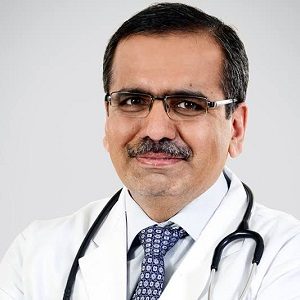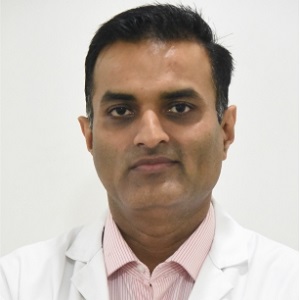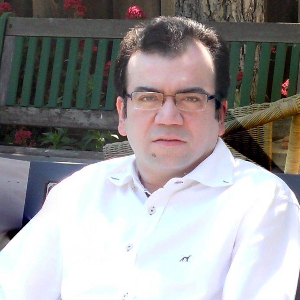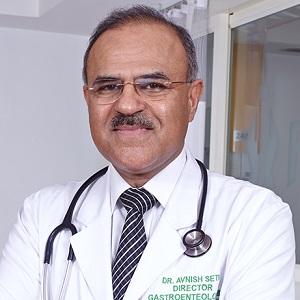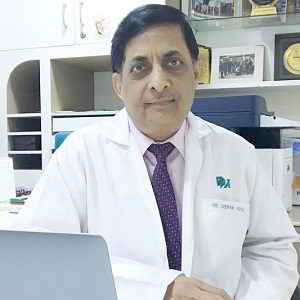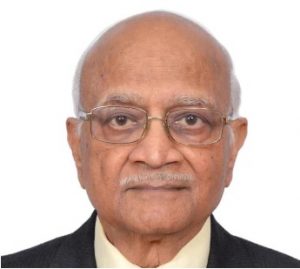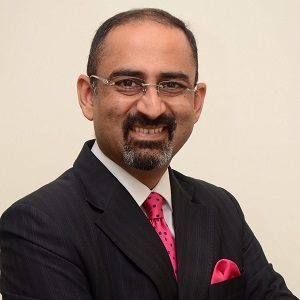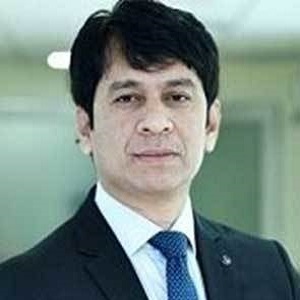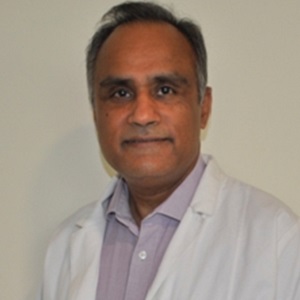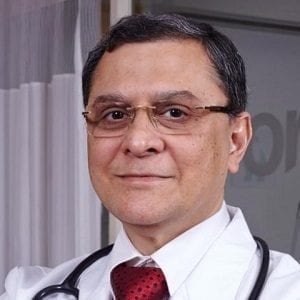Best Doctors in India for Treatment of Diverticulitis
- Medical Gastroenterologist and Hepatologist, New Delhi, India
- Over 30 years experience
Profile Highlights:
- Dr. Yogesh Batra is one of the best medical gastroenterologists in New Delhi, India.
- Dr. Batra specializes in therapeutic endoscopy (EUS, ERCP), hepatology, pancreatic disease, and inflammatory bowel disease (IBD). He has successfully performed a variety of diagnostic and therapeutic GI procedures on hundreds of patients throughout his career.
- Gastroenterologist, Gurugram, India
- Over 15 years’ experience
Profile Highlights:
- Dr. Pawan Rawal continued to work in PGIMER, Chandigarh after completing his DM for the next few years and gained proficiency in clinical Gastroenterology, Hepatology, and its application to patient care.
- He has performed several adults and pediatric upper G I endoscopies/ colonoscopies, ERCPs, capsule endoscopies, and push and double-balloon enteroscopy. Dr. Pawan Rawal is quite experienced in performing all kinds of therapeutic procedures.
- Liver Transplant Surgeon and HPB Surgeon, New Delhi, India
- Over 33 years’ experience
Profile Highlights:
- Dr. Subhash Gupta is one of the finest Gastrointestinal and Liver Transplant Surgeons in the country. He has garnered an outstanding reputation in the field of Biliary, pancreas, and liver transplantation.
- He has conducted over 300 Living Donor Liver Transplants in the year 2013 each lasting 10-16 hours long.
- Dr. Subhash Gupta is also known to pioneer the development of Living Donor Transplant or LDLT.
- Gastroenterologist, New Delhi, India
- Over 27 years’ experience
Profile Highlights:
- Dr. Avnish Kumar Seth is a well-renowned name in the field of gastroenterology. With fellowships in Liver transplant (Birmingham, UK) and Endoscopic ultrasound (South Carolina Alabama, USA), Dr. Avnish Seth’s areas of interest include treatment of hepatitis B, Hepatitis C, liver transplantation, and advanced GI endoscopic procedures.
- Dr. Avnish Kumar Seth has over two decades of experience in Gastroenterology Hepatobiliary Sciences. An expert in Diagnostic Therapeutic GI Endoscopy, Colonoscopy, ERCP, and Liver Transplantation.
- Surgical Gastroenterologist, New Delhi, India
- Over 29 years experience
Profile Highlights:
- Dr. Deepak Govil is one of the best Surgical Gastroenterologists in India, having over 29 years of experience in GI procedures. He has worked as a senior Gastro and laparoscopic surgeon at Indraprastha Apollo Hospitals.
- Dr. Govil, the founder of PSRI’s Department of GI Surgery, has done a lot of significant GI surgical interventions.
- He is well-known for having done liver transplants upon living donors. At Apollo Hospital, he has performed over 2000 surgeries that include the liver, gastrointestinal tract, and laparoscopic procedures.
- In addition to his fieldwork, Dr. Govil has taught at prestigious medical institutes in Delhi.
- Medical Gastroenterologist, New Delhi, India
- Over 45 years’ experience
Profile Highlights:
- Dr. D K Bhargava is a Medical Gastroenterologist working at Indraprastha Apollo Hospitals, New Delhi.
- He has 45 years of experience in his field.
- Dr. Bhargava was a Professor of Gastroenterology at the All India Institute of Medical Sciences, New Delhi formerly.
- Some of the services he provides are Colonoscopy, Gastroenteritis Treatment, Acidity Treatment, and Irritable Bowel Syndrome Treatment.
- Exceptionally qualified Dr. D K Bhargava has received the Padma Shri Award and Dr. B C Roy National Award from the President of India.
- He has published more than 150 articles, papers, and journals throughout his career.
- He is a member of the American Gastroenterological Association, Indian Society of Gastroenterology and American College of Gastroenterology.
- Pediatric Gastroenterologist, New Delhi, India
- Over 26 years’ experience
Profile Highlights:
- Dr. Anupam Sibal is one of the best Pediatric Gastroenterologists in Delhi, having nearly 26 years of experience in treating GI and liver disorders.
- He is a senior consultant for Pediatric Gastroenterology and Hepatology at Indraprastha Apollo Hospital, Delhi. Additionally, he is working as Group Medical Director of Apollo Hospitals.
- He has expertise in Congenital Disorders Evaluation & Treatment, Growth & Development Management, injuries in children, and complete Paediatric health checkups.
- Dr. Sibal went for International certifications and training to improvise.
- Dr. Sibal won many National and International Awards for his excellent work.
- Besides authoring 99 medical writing Dr. Sibal has written a bestselling book, “Is Your Child Ready to Face the World?” and edited/proofread a textbook on Gastroenterology & Hepatology.
- Liver Transplant Surgeon & HPB Surgeon, Gurugram, India
- Over 15 years’ experience
Profile Highlights:
- Dr. Giriraj Singh Bora is a liver transplant surgeon, who is known for being the founder member of the Liver Transplant Society of India.
- He is the first doctor to transplant a liver in Rajasthan. He is also known for carrying out the first deceased donor and the first living donor liver transplants in Rajasthan and has also been instrumental in starting a liver transplant program in the region.
- Gastroenterologist, New Delhi, India
- Over 20 years’ experience
Profile Highlights:
- Dr. Vivek Raj is a well-known Gastroenterologist with a clinical experience of 20 years in the field.
- His medical interests are managing ERCP, Liver Diseases, and Colonoscopy.
- He is a member of various renowned organizations.
- Gastroenterologist, Gurugram, India
- Over 30 years’ experience
Profile Highlights:
- Dr. Gourdas Choudhuri is a gastroenterologist, medical educator, researcher of national eminence, as well as a columnist and philanthropist.
- He completed his training at the All India Institute of Medical Sciences in New Delhi and was the first specialist to start Endoscopic Ultrasound (EUS) and Extra Corporeal Shockwave Biliary Lithotripsy (ESWL) in India.
- It was under Dr. Gourdas Choudhuri’s expert leadership and supervision the prestigious department of Gastroenterology at Sanjay Gandhi PostgraduateInstitute of Medical Sciences, Lucknow, developed into one of the top five in the country.
Best Hospitals in India for Treatment of Diverticulitis
Indraprastha Apollo Hospital, New Delhi
- City: New Delhi, India
Hospital Highlights:
- Indraprastha Apollo Hospital is a 700-bedded multispecialty hospital in the heart of the capital of India. It is a part of Apollo Hospital group, one of India’s most reputed healthcare chains. Indraprastha Apollo Hospital has been accredited by Joint Commission International, making it the first internationally accredited hospital in the country in 2005.
- There are 52 specialties in the hospital with one of the best cardiology centers in the country. The hospital is also equipped with State of the art infrastructure facilities with the largest Sleep Lab in Asia and the largest number of ICU bed facilities in India.
- The hospital also has one of the largest dialysis units in India along with a dedicated Bone Marrow Transplant unit.
- The latest and highly advanced technologies that are installed in the hospital include Da Vinci Robotic Surgery System, PET-MR, PET-CT, Cobalt-based HDR Brachytherapy, Brain Lab Navigation System, Tilting MRI, Portable CT scanner, 3 Tesla MRI, 128 Slice CT scanner, DSA Lab, Endosonography, Hyperbaric Chamber and Fibro scan.
Fortis Memorial Research Institute, Gurugram
- City: Gurugram, India
Hospital Highlights:
- Fortis Memorial Research Institute is a multi-super-specialty, quaternary care hospital with 1000 beds. The hospital comprises reputed clinicians, and international faculty and is also equipped with cutting-edge technology. The hospital is a part of Fortis Healthcare Limited, a reputed chain of private hospitals in India.
- It is a NABH-accredited hospital that is spread across 11 acres of land and has a capacity of 1000 beds. The hospital has 55 specialties and is one of the premier health care centers in the Asia Pacific region popularly known as “the Mecca of Healthcare”.
- The hospital has 260 diagnostic centers and is also equipped with the latest and advanced techniques that include 3 Telsa which is the world’s first Digital MRI technology. The hospital also has world-class Radiation Therapy techniques which have been developed by leading technology experts from Elekta and Brain Lab.
Apollo Hospital, Chennai
- City: Chennai, India
Hospital Highlights:
- Apollo Hospitals, Chennai, is one of the best hospitals for heart care in India. Over the years, Apollo has expanded all over India, as a healthcare chain.
- India’s first ‘Only Pancreas’ transplant was performed in Apollo Hospital. The hospital is known for successfully performing Asia’s first en-bloc combined heart and liver transplant, and over the years, it has attained a remarkable achievement in the global healthcare space. Around 3-4 organ transplants are performed in the hospital per day.
- Equipped with over 500 beds, this hospital in Chennai was established in 1983 and since then has been among the most preferred hospital for patients from all over the world.
- The hospital holds accreditation of the NABH and JCI and is the first hospital in India to be ISO 9001 and ISO 14001 certified. It is also the first South Indian Hospital to receive subsequent reaccreditation from the JCI USA 4 times.
Medanta-The Medicity, Gurgaon
- City: Gurugram, India
Hospital Highlights:
- One of India’s best and largest multi-specialty hospitals, Medanta was built with the aim to bring India to the highest standards of medical care. The hospital has been providing the best medical services to its patients, since its inception, with care, commitment, and compassion.
- Equipped with 1250 beds, the hospital was founded by Dr. Naresh Trehan in the year 2009 with an aim to provide the best medical care at affordable costs. The hospital is spread across 43 acres and includes 45 operation theatres and 350 beds dedicated solely to ICU. The hospital includes over 800 doctors, and more than 22 specialty departments and has a dedicated floor for individual specialty in order to offer the best services under one roof.
- The hospital is considered one of the premier institutes in India for Cardiac Care and includes staffs and members of high caliber. The hospital has 6 distinct centers of excellence.
Max Super Specialty Hospital, New Delhi
- City: New Delhi, India
Hospital Highlights:
- One of the well-regarded providers in India committed to the highest standards of clinical excellence and patient care, Max Super Specialty Hospital is a part of Max Healthcare, which is the second-largest healthcare chain in India. Regarded as one of the most well-regarded healthcare providers in the country, Max Super Specialty Hospital is committed to the highest standards of clinical excellence as well as patient care. The hospital is also equipped with the latest technology as well as cutting-edge research. The hospital is known to deliver and ensure the highest level of patient care.
- The hospital has more than 500 beds and offers treatment for over 35 specialties. The hospital also holds the credit of having installed the first Brain Suite in Asia. This is a highly advanced Neurosurgical machine that allows MRI to be taken while surgery is ongoing.
- Other advanced and latest technologies are also installed in the hospital such as the 1.5 Tesla MRI machine, 64 Slice CT Angiography, 4D ECHO, LINAC, and 3.5T MRI machine.
Artemis Hospital, Gurugram
- City: Gurugram, India
Hospital Highlights:
- One of the most well-known hospitals in the Delhi NCR, Artemis Hospital is the first hospital in Gurugram to get accredited by the Joint Commission International.
- With more than 40 specialties, the hospital has been designed to be one of the most technically advanced hospitals in the country, with the best medical and surgical health care. The hospital has eleven special and dedicated centers, for Heart, Cancer, Neurosciences, etc.
- The latest technologies in the hospital include Endovascular Hybrid Operating Suite and Flat panel Cath Labs for the cardiovascular department, 3 Tesla MRI, 16 slice PET CT, 64 Slice Cardiac CT Scan, HDR Brachytherapy, and highly advanced Image Guided Radiation Therapy techniques (LINAC) are installed in the hospital.
- The hospital has won several awards as well, since its inception.
BLK Max Super Specialty Hospital, New Delhi
- City: New Delhi, India
Hospital Highlights:
- Equipped with 650 beds, BLK Superspecialty Hospital is the largest stand-alone private sector hospital in Delhi.
- With over 1500 healthcare providers and 150 globally renowned super specialists, the hospital is one of Asia’s largest Bone Marrow Transplant Centres. The hospital is known for having some of the best cancer doctors in the country.
- The hospital is NABH and NABL accredited and was inaugurated by the first Prime Minister of India. Pt. Jawahar Lal Nehru.
Gleneagles Global Hospitals, Chennai
- City: Chennai, India
Hospital Highlights:
- Established in 1999, Gleneagles Global Hospital, Chennai, is one of the top healthcare facilities in Southern India. It is part of the Gleneagles Hospital Chain, which is the fourth largest healthcare chain in the country. The hospital specializes in multi-organ transplants of kidneys, liver, lungs, heart, etc.
- The hospital has an excellent infrastructure and state-of-the-art lab and equipment set-up. The hospital boasts cutting-edge technologies, a highly skilled team of doctors and surgeons, and trained support staff. Located in Perumbakam, Chennai, it is one of India’s premier health care destinations. The hospital has performed some of the most complex surgical and clinical procedures in India including multi-organ transplantations.
- The hospital’s lung transplantation program is one of the best in the country. The hospital is known for having performed India’s first single lung transplant and first minimal invasive lung transplant. It is also the only Indian hospital to be associated with King’s College Hospital, London, United Kingdom for liver transplantations.
Fortis Hospital, Mulund, Mumbai
- City: Mumbai, India
Hospital Highlights:
- Fortis Hospital in Mulund is a 315-bed multi-speciality tertiary care hospital with five JCI accreditations that offers a wide variety of diagnostic and therapeutic services. The Fortis Hospital in Mulund delivers patient-centred treatment with cutting-edge technology, highly skilled and experienced surgeons, and paramedical staff.
- This institution houses Maharashtra’s largest multi-organ transplant centre. It is also the first heart transplant centre in western India to conduct 100 or more consecutive heart transplants in under four years. It is the only hospital in the city to have multi-organ transplants and has handled the youngest patient for angioplasty. Fortis Hospital Mulund now boasts the first advanced surgical robot in central Mumbai.
- Cardiology and heart surgery, urology, nephrology, neurosciences, orthopaedics, digestive care, emergency and critical care, and maternity care are among the services provided by the hospital.
Kokilaben Dhirubhai Ambani Hospital, Mumbai
- City: Mumbai, India
Hospital Highlights:
- Kokilaben Dhirubhai Ambani Hospital, Named after the wife of Indian industrialist Dhirubhai Ambani, the founder of Reliance Industries, this is one of the top hospitals in Mumbai. This 750-bed multi-specialty hospital became operational in 2009. Known as one of India’s most advanced tertiary care facilities, the hospital is designed to raise India’s global standing as a healthcare hub, with an emphasis on excellence in clinical services.
- Kokilaben Dhirubhai Ambani Hospital uses Protocol and Care Pathway based treatment models to ensure the best outcomes for patients.
- The hospital represents a confluence of top-notch talent, cutting-edge technology, state-of-the-art infrastructure, and, most importantly commitment.
- The hospital also holds the accreditation of the NABH, NABL, CAP, and JCI.
- The hospital has been recognized as the No. 1 Multispecialty Hospital in Mumbai and the West Zone for the fifth year in a row in 2020 by The Week.
What is Diverticulitis?
Diverticula are small pouches that develop in the lining of your large intestine, usually forming in the lower part of the organ. Now, while diverticula are quite common (especially among 40+ year olds ) and harmless in nature, the most common disorder of the diverticula will be Diverticulitis, a condition where one or more of the pouches become inflamed or infected. While most Diverticulitis cases just need dietary regulations, some of the severe cases may require surgical intervention for complete treatment.
Did you know?
Almost 50% of people reaching the age of 50 will have some form of Diverticulitis, be it mild or severe in nature.
Symptoms of Diverticulitis
While most people with this condition hardly experience any form of symptoms, common Diverticulitis symptoms can still be narrowed down to:
- Chronic pain in the abdomen (the lower left side)
- Constipation or diarrhea
- Bloating
- Abdominal sensitivity
If the Diverticula gets inflamed, you may experience additional symptoms such as;
- Nausea or vomiting
- Fever
- Rectal bleeding
- Bloody stool
Causes of Diverticulitis
The colon in the human body is quite a fragile organ which when subjected to pressure of any sort may pave way for diverticulitis. Even though causes usually vary from individual to individual, doctors have streamlined the primary causes or risk factors for developing diverticulitis as:
- Lifestyle Habits- Research says smokers are more likely to fall prey to diverticulitis than non-smokers or people who consume limited amounts of alcohol
- Dietary choices- If your diet includes high-level animal fat and low-fiber combination, you might risk developing diverticulitis
- Weight- Being obese or overweight will immediately increase your chances of developing this condition as excess body fat often puts unnecessary pressure in the abdominal area.
- Sedentary lifestyle- Poor dietary choices, overweight and a lifestyle without basic exercises together can increase your chances of developing this disease.
In some rare cases, certain medications such as invasive steroids, opioids, frequent intake of anti-inflammatory drugs, etc can increase the chances of developing this condition.
Did you know?
Dietary habits amongst Africans and South Asians are high in fiber which is why this condition is not too common amongst these parts of the world. However, fiber intake is low in western countries which makes Diverticulitis quite a common condition for these countries.
Diagnosis of Diverticulitis
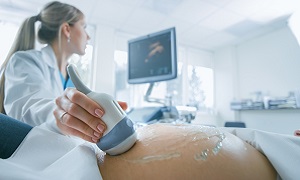
Based on your medical history, ongoing treatment, current and past medication history and other variable factors; your healthcare professional might prescribe a list of tests to determine the presence of diverticula in your intestines. Some of these tests include:
- Ultrasound, MRI or CT scan
- Pregnancy Test (in some rare cases, this condition can be confused with pregnancy)
- Urine or stool sample examination (to determine the presence of infection)
- Colonoscopy
- Pelvic exam in women (to rule our gynecological complications)
Treatment options of Diverticulitis
Diverticulitis is a disease that you can self-treat with a little help from your healthcare professionals. While most cases are harmless, some active cases may require surgical intervention. On diagnosis, your doctor will gauge the intensity or severity of the condition and prescribe a treatment method that fits the reports.
While treatment methods heavily vary, the most common ones include:
Self-Care
Self-Care includes both dietary changes and restrictions along with lifestyle changes. For instance, in order to give your digestive system some rest, your doctor may put you on a liquid diet for a while. Your dietitian or doctor can also limit fiber intake in the initial stages and encourage you to consume more as your symptoms improve. Self-care would also include reducing medication intake, especially blood-thinners, painkillers, and aspirin. This would also mean saying no to smoking or alcohol consumption until your doctor gives you the go-ahead!
Medical Draining
Surgery
Possible complications of Diverticulitis
Ignoring symptoms or treatment for Diverticulitis may result in either one or more of these complications-
- An infected diverticula can pave path for fistulas that proceed to connect with nearby organs creating a complication
- Sometimes, an inflamed or infected diverticula can create pus pockets known as Abscesses. This situation can further worsen into a condition we call peritonitis.
- Intestinal blockage can be one of the complications
- Scarring or tearing of the abdominal wall can lead to further complications.
Prevention is Better Than Cure
While Diverticulitis based on the severity of the condition can be treated, doctors often recommend prevention over cure with some of the preventive steps to a healthy intestine including:
- Dietary or nutritional control (Consult a dietitian if needed)
- Basic exercise (free-hand, running, cycling)
- Medication restriction (consult your healthcare professional if medication is prescribed)
- Quit Smoking
- Body weight maintenance
FAQs
Are there any special dietary recommendations for this condition?
Yes! Doctors often recommend ample amount of fluid intake and bulk-forming laxatives (only after discussing with your healthcare professional)
What sort of diet should I generally avoid?
Usually, food saturated in high animal-fat (red meat for instance) is considered bad for this condition and for your health in general. Try combining your meat intake with a healthy amount of fiber intake.
Will my Diverticulitis recovery take long?
Recovery heavily depends on the severity of your condition. If there are no complications involved, antibiotics prescribed alone can show positive results within 24hr. The condition should dissolve within 5-10 days completely. Surgical treatment methods may include longer recovery.
Can I ease the Diverticulitis pain at home?
Yes you can! Doctors often recommend heating pads or relaxation techniques such as deep breathing to check diverticulitis pain instantly. However, if this doesn’t work, you can opt for non-prescription pain medication for excruciating pain (only on doctor advisory)

